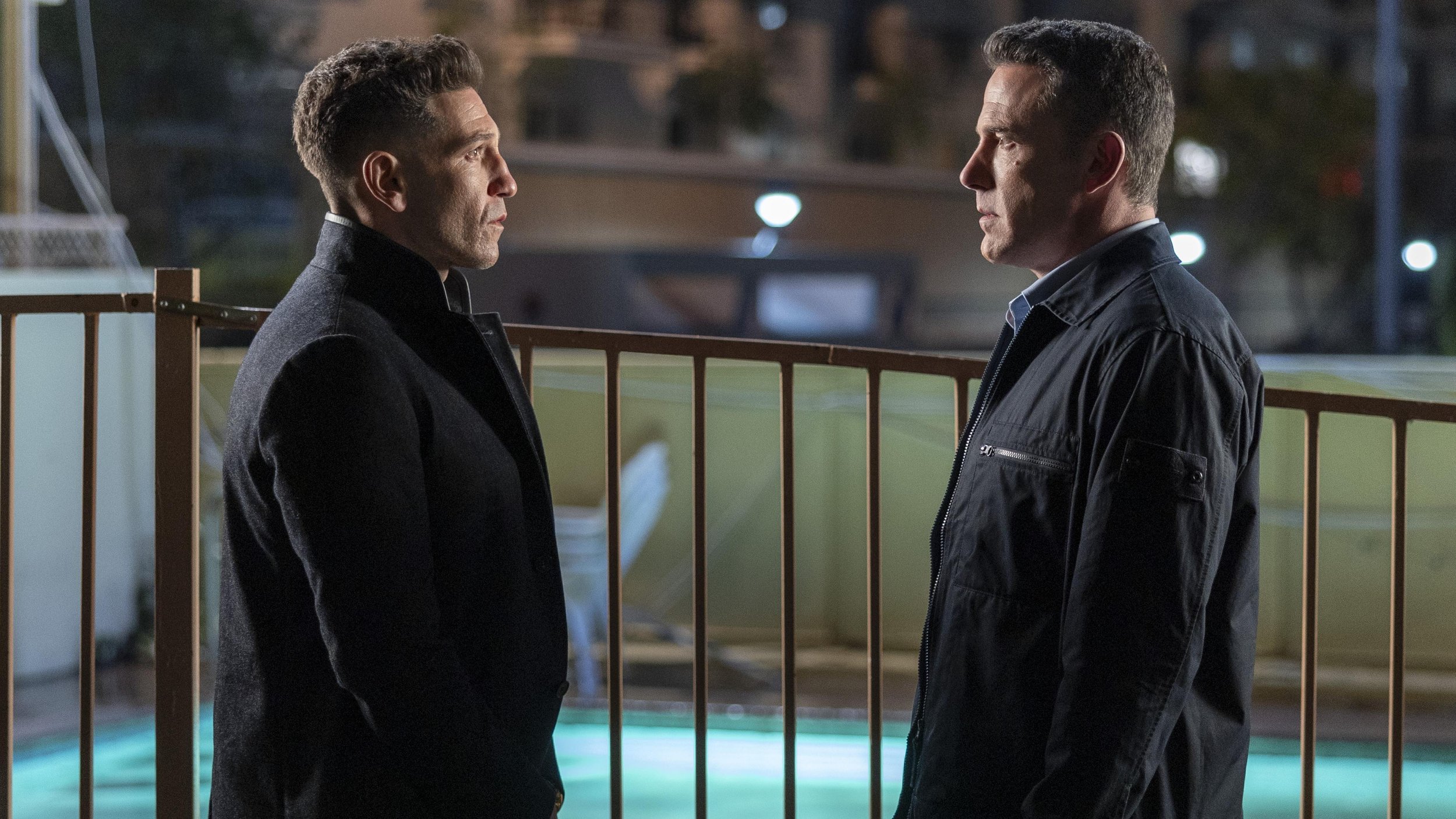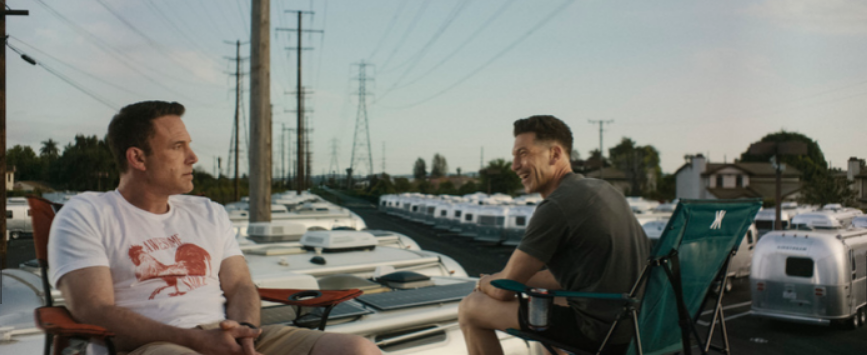
The Accountant 2
April 23, 2025 / Kevin Ward — ★★★½☆
It hits you while the Wolff brothers lounge atop a tricked-out luxury Airstream, chewing over old wounds and new plans—The Accountant 2 might actually be getting smarter as it gets sillier. That mid-film breather, nestled between bruising brawls and breakneck setpieces, captures the film in miniature: unexpectedly self-aware, slyly character-driven, and somehow still deeply committed to its off-kilter premise. The plotting is tighter, the punches land harder, and the supporting players have been given more room to operate, enriching the world around Christian (Ben Affleck) without distracting from it. It remains an improbable franchise—born from a high-concept pitch that turned an autistic accountant into a spreadsheet-wielding vigilante savant—but this time, director Gavin O’Connor leans all the way in, steering things confidently into Fast & Furious territory. The family may be smaller, but the bonds—and the bruises—run deep.
The Accountant, released in 2016, was an anomaly: a mid-budget actioner that felt like a mash-up of John Wick and a behavioral case study. Critics were mixed, audiences intrigued, but its modest box office success made a sequel feel possible, if not probable. But nearly a decade passed. Nine years later, the Wolff brothers are back—not through the original studio, Warner Bros., but via Artist Equity, the independent production company helmed by Ben Affleck and Matt Damon, and this time distributed by Amazon MGM. The shift is more than a corporate footnote; it subtly recalibrates the film’s ambitions. While still a genre vehicle, The Accountant 2 carries a slightly sharper sense of creative control—leaner, riskier, and, in moments, surprisingly soulful.
Still, no matter how polished the fight choreography or how satisfyingly ludicrous the action setups, it’s clear who the film belongs to. Every time Jon Bernthal is on screen, The Accountant 2 hums with energy. His character, Braxton, has come a long way from the muscle we met in the first film—he’s now fully integrated into Christian’s world, and the film thrives when they’re together. The brotherly back-and-forth is pure gold: biting, hilarious, and occasionally moving, built on a bedrock of unresolved childhood trauma and mutual affection they’re both still learning to express. Whether they’re cracking wise in the middle of an extraction or unloading on a dozen goons with blunt instruments, there’s a magnetic rhythm to their dynamic. It’s the kind of lived-in rapport that suggests an entire unseen history, the emotional equivalent of shorthand. Jon Bernthal, as always, doesn’t just chew scenery—he devours it whole, then grins through the crumbs.
That interplay becomes the emotional spine of a film that otherwise functions like a high-functioning spreadsheet of genre beats. This time around, the narrative has Christian deploying a new network of support—the Harbor Neuroscience Academy, a collective of neurodiverse young computer savants and they serve as a sort of hive-mind “guy in the chair” to Christian and Braxton’s boots-on-the-ground operations. If it’s a little fantastical, it’s also fitting—a rare bit of utopian thinking in a franchise otherwise skeptical of institutions. The idea that someone like Christian would pay it forward, offering resources and community to kids like him, is one of the film’s more subtly touching choices.
Opposing—or at least tempering—the chaos is Cynthia Addai-Robinson's Marybeth Medina, returning as the by-the-book Treasury agent now warily collaborating with the Wolff brothers. No longer an unwilling pawn, Medina finds herself reluctantly endorsing their tactics, even as she visibly wrestles with the moral compromises involved. Cynthia Addai-Robinson grounds the character with a steely performance and just the right amount of skepticism, embodying the push-pull between institutional protocol and results-driven pragmatism. Once again, her path briefly intersects with J.K. Simmons' Ray King, whose reappearance—brief but weighty—serves as the narrative spark that pulls Christian back into action.
Of course, this is still an action movie, and The Accountant 2 delivers. The fight scenes are clean, brutal, and largely practical—Gavin O’Connor shoots with clarity and weight, never losing the geography of a scene, and the stunt team deserves serious credit for choreographing sequences that feel both mathematical and visceral. But the real crowd-pleaser? That belongs to Ben Affleck, whose unexpected mid-film line dancing scene at SXSW triggered the kind of thunderous applause usually reserved for Marvel cameos. It’s a moment that toes the line between character work and meme, and had Ben Affleck not been in the audience that night, it might’ve landed differently. But there’s a warmth to it, a recognition that beneath the stoicism and spreadsheets, Christian Wolff is still learning how to live in the world—and willing to take a few awkward steps to get there.
If there’s a flaw in the first film, it's that it struggles a bit to balance its high-minded psychological premise with its pulp execution. But The Accountant 2 seems more comfortable in its own skin this time, embracing the contradictions rather than trying to resolve them. It’s a better film for it—sharper, funnier, and, in its own quiet way, more human.
In a cinematic ecosystem overrun with legacy sequels and IP necromancy, The Accountant 2 feels oddly refreshing: not because it reinvents the wheel, but because it actually seems to care about its characters. And in Jon Bernthal, it has an ace in the hole—an actor who can make fraternal bonding feel as thrilling as a hail of bullets. Here’s hoping we don’t have to wait another decade for The Accountant 3. There's more to tally up.
Director: Gavin O’Connor
Screenplay: Bill Dubuque
Cast: Ben Affleck, Jon Bernthal, Cynthia Addai-Robinson, J.K. Simmons, Daniella Pineda, Alison Robertson
Producer: Lynette Howell Taylor, Ben Affleck, Mark Williams, Sasha Veneziano
Runtime: 124 minutes
Rated: PG-13

